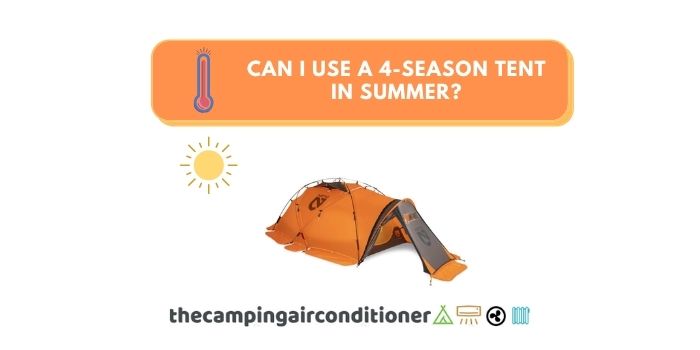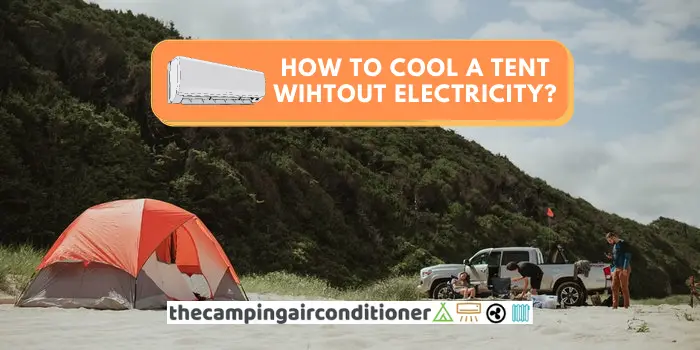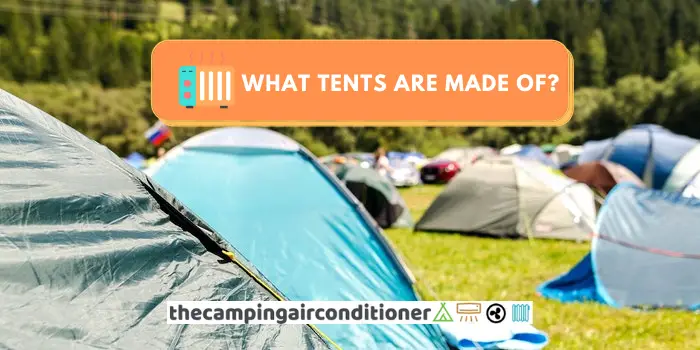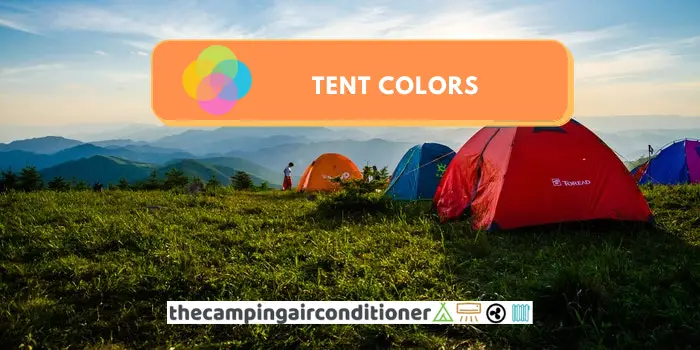If you are not an experienced camper, you might get confused with the terms 3-season and 4-season tent. Don’t worry; we will explain everything to you in this post!
While 3-season models are the most common products in the market, 4-season tents were created to help campers tackle cold weather and freezing nights.
However, many campers have raised the question: can you use a 4 season tent in summer?
In short, yes, you can. But you need to pay attention to some details to ensure a comfortable camping experience, as 4-season tents were designed to deal with adverse winter conditions.
Let’s go through some tips that will help you use a 4-season model during the hot season.

By the way, The Camping Air Conditioner is sponsored by readers. When you buy through one of our links, we may earn an affiliate commission at no extra cost to you.
What is a 4 season tent?
Four season tents are known to be heavy-duty and well prepared to deal with cold weather, including snowing days.
Generally, they use stiffer poles and structures to support potential snow loads and strong winds. Consequently, they tend to be heavier and bulkier, making their transportation and pitching time-consuming.
However, more recently, manufacturers have developed 4-season models which are lightweight and easy to set up, such as Geertop 4 season winter family camping (2, 4 people), which only weighs 9.1Lbs (4kgs).
Geertop 4 season winter family camping (2, 4 people)
In terms of geometry, 4-season models are commonly dome-shaped to ensure better aerodynamics to deal with strong winds and avoid snow accumulation.
They normally come with reduced mesh areas to increase tent insulation and ensure a warm environment inside your shelter. Some models already come with snow flaps.
Regarding tent fabrics, they are usually made of polyester or nylon to decrease weight and facilitate transportation.
What is the difference between a 3 Season and 4 season tent?
The 3-season tent models are designed to ensure versatility and portability. These models are generally used for camping during spring, summer, and autumn (if you don’t have a harsh winter in your area, they will also suit you well).
Models like Naturehike Mongar (2 Person) and Coleman Canyon (up to 8-person) are excellent hybrid alternatives (both are shown below and work better in summer and mild winter days).
Compared to 4-season models, 3-season gear has more meshed areas to ensure improved air circulation (which is excellent to eliminate condensation risks), lighter poles and a weaker structure.
As for geometry, you will find a wide variety of options, with plenty of wall, bell, cabin, and dome-shaped models available. Three season tents are also usually cheaper than 4-season models.
Main differences between 3-season and 4-season tents
- 3-season tents tend to be lighter and easier to set up
- 4-season tents structure are stiffer and will deal better with harsh winter conditions (strong wind and snow)
- 4-season are usually dome-shaped, whereas 3-season models are manufactured in a wide variety of shapes
- 3-season tents are typically cheaper
- 3-season tents have more meshed areas and come with improved air circulation
So, Can you use a 4 season tent in summer?
Yes, you can. It might not be ideal, but if you don’t want to invest in another tent or simply like the model you already have, you can do it.
As we detailed above, 4 season tents tend to have less breathability and allow for lower air circulation, which might significantly increase temperatures in your shelter during scorching days, and you might face tent condensation problems.
These issues might get worse if you are using a double-wall tent. So, how do you mitigate these problems? Check below!
How to use a 4 season tent in summer?
You can implement several simple and easy measures to help you use a 4-season tent in summer, such as:
#1 - Pitch your tent in perfect spot
Pitch your 4-season tent in shaded areas with plenty of air circulation. An excellent idea would be setting it up close to hills, trees, rivers, and water mains.
Avoid direct exposure to sunlight since warm air can get trapped inside your shelter.
#2 - Remove the rainfly
If the weather is dry, you won’t need a rainfly (or second wall) for your tent. Removing this layer will improve air circulation and decrease tent condensation risks.
Some 4-season models come with meshed tops, which will be benefical i
#3 - Open doors and lateral vents
Leave doors and lateral vents open during the day to improve and increase airflow. During the night, we suggest checking whether mosquitos are around.
#4 - Consider an AC or solar-powered fans
You can decide on bringing a camping air conditioner to cool down your tent. You can choose from mini AC options to battery-powered options.
If you are camping in a large group, why not consider a portable AC or an AC window unit?
Solar-powered fans and evaporative coolers are budget-friendly solutions if air conditioning is not your thing.
#5 - Forget about your sleeping bag
The majority of sleeping bags were designed to deal with winter days and cold weather. Even though they can be comfy, using them in summer within a 4-season tent might not be the ideal match.
Do I need a 4-season for winter camping?
Well, it depends. If you plan to camp in heavy winter conditions, with snow and high winds, we definitely advise you to have a 4-season tent.
On the other hand, in mild winter conditions, with temperatures from 0 to 15 degrees Celsius (32F to 60F), a 3-season tent with a heater will be sufficient.
You might need to make minor adjustments to ensure your 3-season model will perform well in cold conditions, though – read this article to know more about them.
How much warmer is a 4-season tent?
Expect 4-season tents to be up to 15 Fahrenheit degrees warmer than the outside environment. The exact temperature difference will depend on tent features, insulation, and camping conditions.
What are the best tents for summer and hot weather?
We wrote an article with the best tents for camping in hot weather – read it here. Our recommendations are (check our article if you want a detailed review of each product):
- Best option for family camping – Core 12 Person Extra Large Cabin Tent
- Best canvas tent option (4,6, and 8 people) – Kodiak Canvas flex-blow
- Best option for backpackers and hikers – Hyke & Byke Zion Hiking & Backpacking Tent
- Best Budget-Friendly option – Coleman Sundome Tent
- Best lightweight option (1-person tent) – TETON Sports Altos Tent
- Best pop up tent option for hot weather –Eackrola 2/4 person instant pop up tent
- Best Option with screen room – Wenzel Klondike 8 Person (w/ screen room)
- Best option with AC port –Ozark Trail 16×16-Feet 12-Person Instant Tent
FAQ
3 Season vs 4 season Tent - What is the best?
There is no best or worst tent model. What will govern this answer is the weather conditions of your campsite. If you are camping in heavy winter, with windy and snow conditions, we recommend picking a 4-season tent.
On the other hand, a 3-season model might handle well a cold night with temperatures as low as 32F.
Are there 1 and 2 season tents?
There are, but they are very basic and not too frequently used these days.
How hot is too hot for summer camping ?
To answer this question, you should further understand the wet-bulb temperature concept. The maximum temperature that a human being can handle depends on humidity levels – read this article to further understand.
In a nutshell, the higher the humidity levels, the less capable a person will be of handling high temperatures.
Recent research that the human body can support up to 95°F within high humidity levels (wet-bulb temperature).
Can I use a 3 season tent during winter ?
Yes, you can. If conditions are not too harsh, you can use your 3-season tent for winter camping. Some tips to improve its performance on cold days are:
- Insulate your tent for winter
- Use a tent insulation liner
- Bring an adequate sleeping bag
- Use a portable heater
Final Thoughts
Even though 4 season tents are designed for severe winter conditions, you can use them during summer days. If you already have a 4 season model, make sure you pitch your tent in a shaded area with plenty of ventilation.
If you want to buy your new tent, we suggest picking one with removable double walls and as much meshed area and vents as possible. These openings will help you during hot summer days.
















